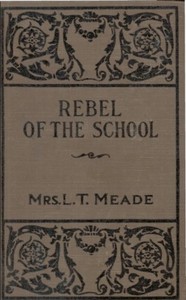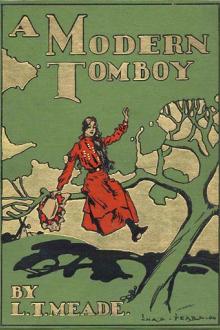The Rebel of the School, L. T. Meade [best historical biographies .txt] 📗

- Author: L. T. Meade
Book online «The Rebel of the School, L. T. Meade [best historical biographies .txt] 📗». Author L. T. Meade
"I think you are very rude indeed, Aunt Church," said Susy. "I don't see that I'm bound to submit to your ugly, cruel words. I like this blouse, and I'll wear it whenever I wish."
"Oh, hoity-toity!" said the old lady; "impudent as well as everything else. That I should live to see it!—Mary Hopkins, can it be convenient to you to let me have the remainder of my hundred pounds? There wasn't any contract but that I could demand it whenever I wanted it, and it is about convenient to me that I should have it back now. You owe me between thirty and forty pounds, and I'd like, I will say, to see the color of my money. It can't be at all ill-convenient to you to give it to me when you can afford blouses of that quality for your impudent young daughter. Real lace, forsooth! I know it when I see it. We'll say Wednesday week to receive the money, and I will come over in my bath-chair, drawn by Tom, to take it; and I will give Tom a whole shilling for himself the day I get it back. That will be quite convenient to you, Mary Hopkins, won't it?"
"Susy," said poor Mrs. Hopkins, "for goodness' sake, leave the room.—Aunt Church, you know perfectly well that I am not responsible for the naughty ways of that naughty little girl. It's apologize to you she shall, and that before you leave this house. And you know that if you press me now to return the money in full I'll have to sell up the shop, and the children won't have anything to eat, and we'll all be ruined. You wouldn't be as cruel as that to your own flesh and blood, would you?"
"Well, Mary, I only said it to frighten you. I ain't at all a cruel woman. On the contrary, I am kind-hearted; but I can't stand the sauce of that little girl of yours. It's my opinion, Mary, that the lost money of yours is on the back of your Susan, and the sooner you get her to confess her sin the better it will be for us all."
Now, before Mrs. Hopkins had time to utter a word with regard to this preposterous and appalling suggestion of Aunt Church's, there came a loud knock on the little street-door, and, listening in the parlor, the people within could distinctly hear the rustle of silk petticoats.
"Who in the world can that be?" said Mrs. Hopkins.
Tom turned first red and then white, and rushed into the passage. Susy, who had been crying in the shop, also appeared on the scene.
"I'll open the door," said Tom. "Do wipe your eyes, Susy; don't let her see you crying. It's herself, of course."
The knocker was just going to be applied to the door again, when Tom opened it with a flourish, and there stood, waiting on the steps, a very brilliant apparition. This was no less a person than Miss Kathleen O'Hara, in her Sunday best.
Now, Kathleen tried to bear with Mrs. Tennant's advice with regard to her clothes in the week, but on Sundays she was absolutely determined that her love of finery should find full vent. Accordingly, from her store of rich and beautiful garments, she chose the gayest and the most likely to attract attention. On the present occasion she wore a crimson velvet toque. Her jacket was bright blue, and she had a skirt to match. On her neck she wore a rich necklet of flaming beads, which was extremely becoming to her; and thrown carelessly round her neck and shoulders was a boa of white fur, and she had a muff to match. Altogether her radiant dress and radiant face were quite sufficient to dazzle Tom. But Susy pushed past Tom and held out her hand.
"Oh, Kathleen," she said, "I am glad you have come. You'd best come into the shop with me; there's company in the parlor, and I don't think you'd care about it."
Kathleen, of course, was just as pleased to stay in the shop with Susy as to go into any other part of the house; but just then Mrs. Hopkins put a sad, distressed face outside the door, and Mrs. Church's voice was heard in high and grating accents:
"I want to see the person who is talking in the passage."
"Oh! don't go in," said Susy. "It's Aunt Church, and she's dreadful."
"An old lady?" cried Kathleen. "I love old ladies."
She pushed past Susy and made her appearance in the parlor.
Now, Mrs. Church was a person of discernment. She strongly objected to gay dress on the person of little Susy Hopkins; but, as she expressed it, she knew the quality. Had she not lived all her earlier days as housekeeper to a widowed nobleman? Could she ever forget the fine folk she helped to prepare for in his house? Now, Kathleen, standing in the tiny room, had a certain look of wealth and distinction about her. Mrs. Church seemed to sniff the fine quality air in a moment; she even managed to rise from her chair and drop a little curtsy.
"If it weren't for the rheumatics," she said, "I wouldn't make so bold as to sit before you, miss."
"But why shouldn't you? I'm sorry you suffer from rheumatism. May I bring a chair and come and sit near you? Are you Mrs. Hopkins—Susy Hopkins's mother?"
"Indeed, my dear, I'm truly thankful to say I am not. And what may your name be, my sweet young lady?"
"Kathleen O'Hara."
"Oh, dear, but it's a mouthful."
"I'm not English," said Kathleen; "I'm Irish. Do you know, in our country we have old ladies something like you. A good many of them have dresses like you; and they live in little cottages, and we bring them up to the castle and give them good food very, very often. There are twelve of them, and they all live in their tiny cottages close to each other. We make a great fuss about them. They love to come to the castle for tea."
"The castle!" said Mrs. Church, more and more impressed. "I should think they would like it. Who wouldn't like it? It's a very great honor for an old lady to be entertained to her tea in a castle. And so you live in a castle, my bonny young lady?"
"Yes; my father owns Carrigrohane Castle."
"Eh, love! it is a mouthful of a word for me to get round my lips. But never mind; it is but to look at you to see how beautiful and good you are."
"And you are beautiful, too," said Kathleen. "I mean, you are beautiful for an old lady. I love the beauty of the old. But I want to see Mrs. Hopkins, and I want to see Susy. Susy is a great friend of mine."
Mrs. Church opened her eyes very wide; her mouth formed itself into a round O. An eager exclamation was about to burst from her lips, but she restrained herself.
"And a very good little girl Susan Hopkins is," she said, after a moment's pause; "and a particularly great friend of mine, being, so to speak, my grand-niece.—Mary, my dear, call your little girl in."
Mrs. Hopkins, in some trepidation, crossed the room and called to Susy, who was still sulking in the shop.
"My visitor and all," she kept saying. "And I wanted to have her all to myself; I had such a lot to say to her. I never saw anybody quite so horrible as Aunt Church is to-day."
"Never mind, Susy; never mind," said her mother. "The young lady is pleasing your aunt like anything, and she has sent for you."
"Come along in, Susan, this minute," called out Mrs. Church. "Come, my pet, and let's have a little talk."
"Go, Susy, and be quick about it," said her mother.
By the aid of Tom and Mrs. Hopkins, who pushed Susy from behind, she was induced to re-enter the little parlor. There, indeed, all things had changed. Kathleen called to her, made room for her on the same chair, and held her hand. Mrs. Church glanced from one to the other. Only too well did she see the difference between them. One was a rather plain little girl, the daughter of her own relation; the other was a lady, beautiful, stately, and magnificently dressed.
"I know her kind," thought Aunt Church. "I have aired beds for quality of that sort, and I have watched them when they danced in the big ballroom, and watched them, too, when their sweethearts came along, and seen—oh, yes, many, many things have I seen, and many, many things have I heard of those fair young ladies of quality. She belongs to them, and she likes that good-for-nothing, pert little Susy Hopkins! Yet it don't matter to me. Susy shall have my good graces if she has secured those of Miss Kathleen O'Hara."
Accordingly, Mrs. Church changed her tactics. She praised Susy in honeyed words to the visitor.
"A good little girl, miss, and deserving of anything that those who are better off can do for her. She is a great help to her mother.—Mary Hopkins, come nigh, dear. You are very fond of your Susy, aren't you?"
"Of course I am," said Mrs. Hopkins in an affectionate voice.
Susy longed to keep up her anger, but she could not. She was soon smiling and flushing.
"And what a neat little bodice my Susy is wearing!" said Mrs. Church. "And bought with her own hard-earned savings. You wouldn't think so, would you, miss?"
"It gives her great credit," said Kathleen in a calm voice. "I like people to wear smart clothes, don't you, Mrs. Church? If you lived on our estate, I would dress you myself. I love to see our old ladies gaily dressed. On Christmas Day they come to the castle and have dinner as well as tea. It is wonderful how smart they look."
"They are very lucky ladies—very lucky," said Mrs. Church. "They don't wear old bombazine like this, do they?"
"Your dress suits you very well, indeed," said Kathleen; "but my old ladies wear velveteen dresses. They save them, of course. We don't want them to be extravagant; but they always come up to the castle in velveteen dresses, with white caps, and white collars round their necks; and they look very nice. They have a happy time."
"I am sure they have, miss."
"Yes, they have a very happy time. They want for nothing. There was an old lady belonging to our house who left a certain sum of money, and the old ladies get it between them. They get six shillings a week each, and a dear little house to live in. We are obliged to supply them with as much coal as they want, and candles, and a new pair of blankets on the first of every November, and a bale of unbleached calico on the first of May. You can't think how comfortable they are. And then, of course, we throw in a lot of extra things—the black velveteen dresses, and other garments of the same quality."
"It must be a wonderful place to live in. Is it very difficult to get into one of these houses, missy?"
"I don't know. Would you like to come?"
"That I would."
"I'll write to father and ask him if you may."
"Miss, it would be wonderful."
"You'd be very picturesque amongst them," said Kathleen, gazing at Mrs. Church with a critical eye. "And you'd have so much to tell them; because all the rest are Irish, and they have never gone beyond their own country. But you have seen such a lot of life, haven't you?"
"Miss, I can't express all the tales I could tell. I lived with the quality for so long. I lived with Lord Henshel until he died; I was housekeeper there. Oh, I could tell them lots of things."
"It would be very nice if you came over; and I am almost sure there is a cottage vacant," said Kathleen in a contemplative voice. "It seems unfair to give the cottages entirely to Irish people. We might have one English old lady. You would enjoy it; you'd have such a lovely view! And you might keep your own little pig if you liked."
Mrs. Church was not enamored with the idea of keeping a pig.
"Perhaps fowls would do as well," she said. "I have a great fancy for birds, and I am fond of new-laid eggs."
"Fowls will do just as well," said Kathleen, rising now carelessly from her seat. "Well, Mrs. Church, I will write to father and





Comments (0)